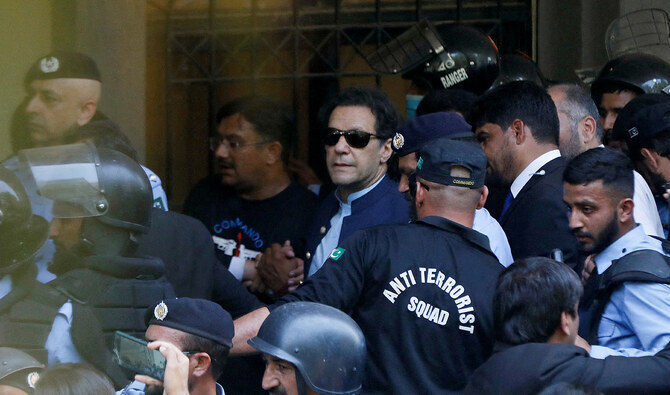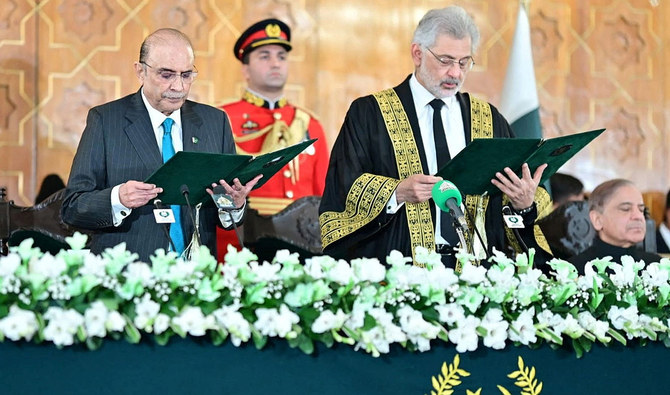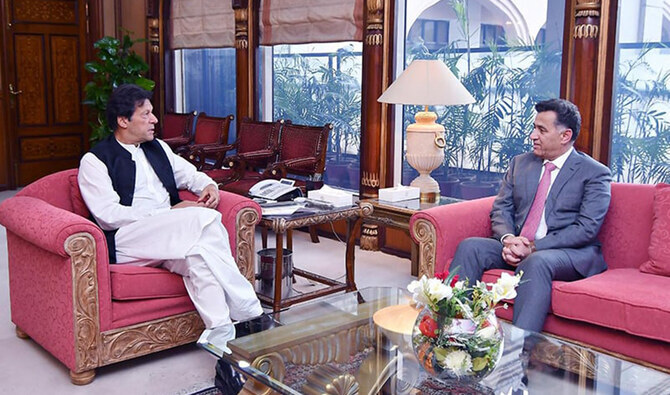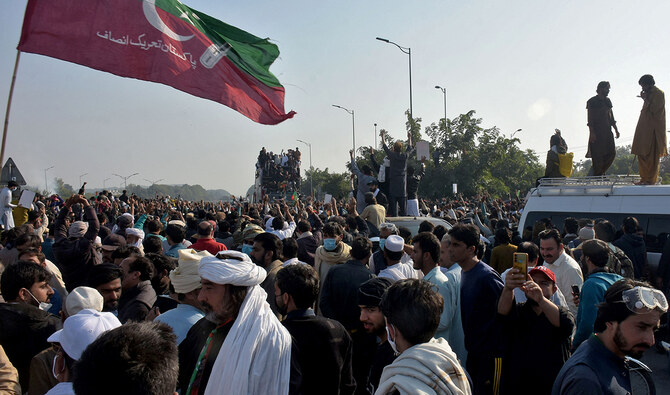ISLAMABAD: Pakistan witnessed intense turmoil and political polarization in 2024, beginning with the sentencing of former prime minister Imran Khan and his close aide Shah Mahmood Qureshi to ten years in prison. It came just days before a controversial general election in February, which was marred by poll-rigging accusations and delayed results.
The political climate continued to worsen with large-scale protests, including a march to Islamabad by Khan supporters that turned violent, with casualties on both sides further fueling tensions.
The month of December was particularly marked by major developments from Khan’s threat of a civil disobedience movement to the criticism of the PM Shehbaz Sharif’s government by international human rights groups over the sentencing of civilians by military courts.
Amid escalating tensions, the year ended with tentative steps toward a dialogue between the government and the opposition, offering a glimmer of hope in a year dominated by political unrest, legal battles and mounting economic challenges.
EX-PM KHAN SENTENCED IN STATE SECRETS CASE
On Jan. 30, a Pakistani court handed former prime minister Imran Khan and his close aide Shah Mahmood Qureshi a ten-year jail term each in a case in which they were accused of leaking state secrets.
The case, popularly called the “cipher case,” related to an alleged diplomatic correspondence between Washington and Islamabad that Khan says was proof that his ouster as PM in 2022 was part of a US-backed “foreign conspiracy” to remove him. Washington has repeatedly denied Khan’s accusations.
The conviction came a week before general election in Pakistan, in which Khan was already barred from standing after he was convicted of corruption.

Security officers escort Pakistan’s former Prime Minister Imran Khan, as he appeared in Islamabad High Court, Islamabad, Pakistan May 12, 2023. (REUTERS/File)
FEB. 8 NATIONAL ELECTION
In February 2024, Pakistan held its national election that was marred by a mobile Internet shutdown on the election day and unusually delayed results, leading to accusations that it was rigged and drawing concern from rights groups and foreign governments.
Former prime minister Imran Khan’s Pakistan Tehreek-e-Insaf (PTI) party was severely hamstrung ahead of the polls, with rallies banned, its party symbol taken away, and dozens of its candidates rejected from eligibility to stand.
Despite that, independent candidates backed by Khan’s party won the highest number of seats, but not enough to form a government on their own. The election saw Khan’s main political rival, Shehbaz Sharif, become prime minister after being favored by a coalition of parties.
To date, the PTI claims the vote was rigged and has held several protest rallies to demand an audit of results. Khan’s opponents and election authorities deny the allegation.

In this handout photograph taken and released by the Pakistan President House on March 4, 2024, Pakistan's President Arif Alvi (R) administers the oath to newly sworn-in Prime Minister Shehbaz Sharif (C) at the President House in Islamabad. (President House/File)
ASIF ZARDARI BECOMES PRESIDENT FOR A SECOND TERM
Veteran politician and Pakistan Peoples Party (PPP) co-chairman Asif Ali Zardari took oath as the 14th president of Pakistan on March 10.
Zardari bagged 411 votes in the indirect electoral contest held in Pakistan’s parliament and provincial assemblies. His opponent, Mahmood Khan Achakzai, who was supported by the Khan-backed Sunni Ittehad Council party, could only secure 181 votes.
Zardari served the previous stint from 2008 to 2013, during which he ushered in constitutional reforms, including the 18th amendment, to ensure greater provincial autonomy, and rolled back presidential powers.

Former Chief Justice of Pakistan Qazi Faez Isa, administers the oath of the office of the President of Pakistan to Asif Ali Zardari (right), at the Presidential Palace in Islamabad, Pakistan, on March 10, 2024. (PID/File)
FORMER SPYMASTER FAIZ HAMEED ARRESTED
In August, Pakistan’s army said it had arrested former spymaster Lt. Gen. (retired) Faiz Hameed and initiated court martial proceedings against him.
Hameed has since been formally arraigned on a number of charges, including engaging in political activities and violating the Pakistan Army Act post-retirement. The former general is widely seen to have been close to ex-PM Khan.
Many analysts believe that Hameed’s unprecedented arrest and possible conviction could raise the heat on Khan and be the precursor to prosecuting the jailed former prime minister before a military court on charges of treason and attempting to incite a mutiny in the military.

An undated file photo of Former Pakistani Prime Minister Imran Khan in conversation with ex-DG ISI Lt. Gen. (retired) Faiz Hameed at the PM Office in Islamabad. (Photo courtesy: PM Office/File)
26TH CONSTITUTIONAL AMENDMENT
On Oct. 21, President Zardari signed into law the contentious 26th constitutional amendment that empowered parliament to choose the country’s chief justice from a panel of three senior-most judges of the Supreme Court among other things.
Another clause of the bill stated that the Supreme Court judges will be appointed by a judicial commission, led by the chief justice and comprising three senior judges, one member each from the National Assembly and the Senate, federal law minister, attorney general of Pakistan, and a nominee of the Pakistan Bar Council having not less than 15 years of practice in the Supreme Court. The commission will also monitor judges’ performance and report any concerns to the Supreme Judicial Council.
The ruling coalition had the amendment passed by both houses of parliament a night before, amid opposition from ex-PM Khan’s party and the legal fraternity, who argued it was an attempt to curtail the independence of the judiciary. The government denied it.
YAHYA AFRIDI TAKES OATH AS CHIEF JUSTICE OF PAKISTAN
Soon after the 26th constitutional amendment, a 12-member parliamentary panel nominated Justice Yahya Afridi for the top judicial post and he took oath of the chief justice’s office on Oct. 26.
Afridi replaced Chief Justice Qazi Faez Isa who retired on Oct. 25 after what was widely considered to be his controversial stint in office for a little more than a year.
Isa was accused by ex-PM Khan’s party of being aligned with the coalition government led by PM Sharif. It was under Isa’s tenure as chief justice that Pakistan’s top court denied Khan’s PTI its iconic bat symbol ahead of Feb. 8 general election, saying the party had failed to hold intra-party elections. The verdict meant all PTI candidates had to contest election as independents, which angered Khan supporters, who accused Isa of being biased in favor of Sharif.
ISLAMABAD PROTEST TO SECURE KHAN’S RELEASE
On Nov. 24, Khan’s PTI party led thousands of supporters to Islamabad, seeking to pressure the government to release the ex-premier from jail and order an audit of Feb. 8 poll results.
The protest, which was by far the largest to grip the capital since the election, resulted in clashes that Pakistan’s government says killed four law enforcers and injured hundreds of others.
The PTI says at least 12 of its supporters were killed and another 37 sustained injuries due to firing by law enforcers near Islamabad’s Jinnah Avenue on Nov. 26. Pakistani authorities have denied the deaths, saying security personnel had not been carrying live ammunition during the protest.

Supporters of jailed former Pakistani Prime Minister Imran Khan’s party Pakistan Tehreek-e-Insaf (PTI) attend a rally demanding his release, in Islamabad on November 26, 2024. (REUTERS/File)
CALL FOR CIVIL DISOBEDIENCE MOVEMENT
Ex-PM Khan on Dec. 6 threatened to start a civil disobedience movement, days after his party led a deadly protest march on Islamabad.
The former premier demanded a judicial probe into the crackdown on the Nov 24 protest march which he said killed at least 12 of his supporters and violence on May 9 last year which killed 8, along with the release of all arrested political workers.
Khan’s call for civil disobedience movement came a day after he was indicted on charges of directing the May 9, 2023 attacks on government and military installations, to which he pleaded not guilty. The indictment was the latest in dozens of cases against the former cricket star, who has been in jail since August last year.
SENTENCING OF PAKISTANI CIVILIANS BY MILITARY COURTS
On Dec. 21, Pakistan’s military announced sentencing of 25 civilians to prison for participating in violent protests on May 9, 2023, when hundreds carrying flags of ex-PM Khan’s party had attacked government and military installations. Khan’s party denies involvement in the violent protests and has called for a judicial probe into the matter.
The United States (US), United Kingdom (UK) and the European Union (EU) expressed concerns over the verdicts, calling on Islamabad to respect the citizens’ right to a fair trial and due process. Pakistan’s Foreign Office dismissed the concerns and said the verdicts had been made under a law enacted by parliament and in line with a judgment of the country’s top court.
Days later, another 60 civilians were sentenced by military courts to jail time ranging from 2 to 10 years in connection with the riots.
TALKS TO EASE RISING POLITICAL TENSIONS
Weeks after Khan’s civil disobedience threat, PM Sharif’s government and Khan’s PTI opposition party held the first round of formal negotiations on Dec. 23, in a bid to ease prolonged political tensions.
Khan previously rejected talks with the government, saying his party would only speak to the ‘real powerbrokers’ in Pakistan, the all-powerful army, but earlier this month he set up a negotiating committee of top PTI members to open dialogue with the government for the fulfilment of two demands: the release of political prisoners and the establishment of judicial commissions to investigate May 9, 2023 and Nov. 26 violent protests.
The country has remained gripped by political unrest and uncertainty since Khan’s ouster from power through a parliamentary no-confidence vote in 2022, which has also exacerbated Pakistan’s economic hardships.
Senior government representatives have recently acknowledged that negotiations could offer a pathway out of the current political impasse, with the PTI asked to present its demands in writing at the next round of talks on Jan. 2.

















